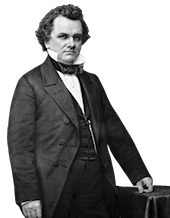The Senate, 1789-1989: Addresses on the History of the United States Senate1
In late April 1861, as the nation moved ever closer to civil war, Stephen A. Douglas delivered a powerful speech in support of the Union to his Illinois constituents.
Earlier that month, the Union garrison at Fort Sumter had surrendered after two days of bombardment by southern guns, and President Abraham Lincoln proclaimed that military force would be used to put down the rebellion.
Stephen Douglas, who had spent the past decade seeking compromises to allow the North and South to coexist peacefully, faced the inevitability of war. Although he was a northern Democrat who had long been a political opponent of President Lincoln in Illinois, as well as an unsuccessful presidential candidate in 1860, Douglas offered the president his approval for military action if necessary to hold the Union together. Douglas was concerned that considerable sympathy for the South existed in the southern portion of Illinois and therefore sought to build support in the state for the president’s handling of the national crisis. Encouraged by his friends to visit Springfield during a special session of the state legislature, the senator left heavily fortified Washington after Congress adjourned, stopping to speak at several towns on the way to Illinois. When Douglas arrived in the state capital on April 25, the Republican dominated legislature formally invited him to address it that evening. During the day, he also spoke encouragingly to two companies of volunteer soldiers and met with Republican officials, seeking to build a bipartisan united front in support of state legislation needed by the president.
Douglas received a warm welcome from the legislators when he arrived at the statehouse for his speech2 that night. To loud applause, he declared that, in the face of hostile action by the South, Democrats and Republicans needed to join together to protect the Union. He pointed out that in 1861 the South had less to fear from the North than in the past: there were no congressional limitations on slavery, and the fugitive slave law was strictly enforced. The secessionists’ only complaint, he contended, was that the Republican party had won the presidential election. Politically, he declared, he was equally opposed to the Republicans and the secessionists, but he believed that “the first duty of an American citizen … is obedience to the constitution and laws of his country.” Urging “the spirit of moderation and of justice,” he asserted that a war against the seceding states would be a war of self defense, defense of rights and of government institutions. When he concluded sadly, “it is a duty . . . to protect this government and that flag from every assailant, be he who he may,” the legislators gave him a standing ovation.
The speech probably changed few minds, since his Republican audience already supported the president’s actions. Yet, as it was reprinted in newspapers across the country, the speech represented a spirited call for cooperation throughout the North to meet the national crisis. Some Illinois Democrats suspected from his remarks that Douglas had defected to the Republican party, but the senator reassured them that he was “neither the supporter of the partisan policy nor the apologist for the errors of the Administration,” but with the Union under attack, “a man cannot be a true Democrat unless he is a loyal patriot.”
Tired from his exertions on behalf of the Union earlier in the year, and depressed by the coming of war, Douglas went home to Chicago to recuperate. He gave one final speech there on May 1 before becoming ill. Although Douglas himself described it as “a severe attack of rheumatism,” his doctors seemed powerless either to help or provide a more detailed diagnosis as new complications continued to develop. Weakening steadily, Stephen Douglas died on June 3, 1861, at the age of forty-eight.
- Byrd, R. C., & Hall, M. S. (1988). The Senate, 1789-1989: Addresses on the History of the United States Senate (Vol. 3). U.S. Government Printing Office.
- Speech of Senator Stephen Douglas before the Legislature of Illinois, April 25, 1861
